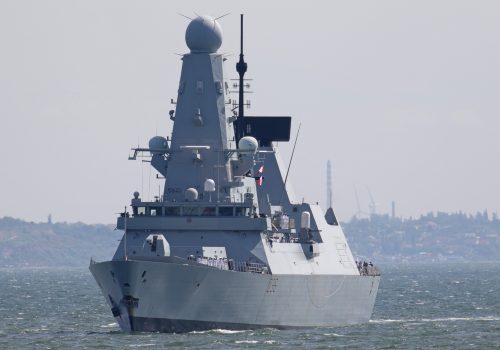Brzezinski testifies to US Senate Foreign Relations Committee on Black Sea security
US Senate Committee on Foreign Relations
Subcommittee on Europe and Regional Security Cooperation
Hearing on
Black Sea security: Reviving US policy toward the region
Chairman Jeanne Shaheen, Ranking Member Ronald Johnson, distinguished members of the Committee, thank you for conducting this hearing to highlight the significance of the Black Sea region and the need for a more effective United States strategy to promote peace and stability in this important and dynamic part of Europe.
For more than a decade and a half, the Black Sea region has been the zone of Europe’s most intense confrontation and violent conflict. This unfortunate reality has been driven by Moscow’s revanchist ambitions, which it has advanced by applying the full spectrum of Russian power, including brute military force.
This was underscored this last Spring when Russian President Vladimir Putin massed military forces along Ukraine’s eastern frontiers and in occupied Ukrainian territories, including Donetsk, Luhansk, and Crimea. That offensive posture remains in place today and poses a real threat to Ukraine and the security Black Sea region.
Russia’s military buildup, its occupation of Georgian and Ukrainian territories, and other provocative uses of armed force and hybrid warfare have transformed the Black Sea into a Russian military lake that President Putin uses to further his disruptive and expansionist objectives in the region and beyond.
This aggression underscores how the Black Sea region has become the soft underbelly of transatlantic security. Nonetheless, this part of Europe has not received the same degree of priority and focus as its northern counterpart, the Baltic Sea region. In the absence of a comprehensive and more assertive strategy on the part of the United States and its allies and partners in NATO and the European Union, the Black Sea region will likely experience a further intensification of Russian aggression. That will not only jeopardize the safety and sovereignty of the region’s democracies but will also increase risk of military conflict, including that with dangerous escalatory dynamics.
The Black Sea: A region of geopolitical significance
The Black Sea is a region of geopolitical significance and has been a long-standing zone of contest among great powers. As a crossroads linking Europe, the Middle East, and Asia, it features strategic lines of communication. The Black Sea is traversed each day by hundreds of ships transporting goods and people from its shores and beyond. The sea hosts numerous telecommunications lines and energy pipelines, including those that bring Caspian oil and gas to Europe. This important role as a trade route and the fact that the Black Sea coast features some of Europe’s fastest growing economies has also made this region a focus of China. Beijing has attempted to established footholds in the region via investments through its Belt and Road Initiative and 17+1 format for regional engagement.
The Black Sea is also a major export route for Russia’s oil and gas. As the home of Russia’s only warm-water ports, it serves as Moscow’s most important access route to the Mediterranean Sea and the Middle East. It serves as an important element of Russia’s main logistics route supporting military and paramilitary operations in Syria, Libya, and elsewhere in the Middle East and Africa.
The six countries that surround the Black Sea include three NATO allies (Bulgaria, Romania, and Turkey), two NATO partners (Ukraine and Georgia), and Russia. Turkey and Romania host two critical elements of NATO’s deployed missile defense system that protects both Europe and the United States: an advanced X-band Radar in Kürecik in southeastern Turkey and an Aegis Ashore facility in Deveselu, Romania which can detect, track, and engage ballistic missiles in flight launched from the Middle East.
The commitment of these NATO allies and partners to the Alliance’s missions should not be underestimated. It is notable that at one time Turkey, Georgia, Ukraine, Romania, and Bulgaria accounted for one third of the military forces deployed to Afghanistan under NATO’s Resolute Support mission.
The Black Sea’s geopolitical significance includes Russia’s presence but also the influence the region has on Russia’s potential to evolve into a democratic, law-abiding power. Former professor and US National Security Advisor Zbigniew Brzezinski (my father) asserted that if Russia is allowed to subordinate Ukraine, Russia will never be able to cease being an empire, and an empire, by definition, cannot be a true democracy. The same logic applies to Russia’s relations with the rest of Black Sea region. A stable, peaceful Black Sea region featuring democratic and secure sovereign states is essential to the prospects of a post-imperial Russia.
Subscribe for events and publications on transatlantic security
Sign up for updates from the Atlantic Council’s Transatlantic Security Initiative, covering the debate on the greatest security challenges facing the North Atlantic Alliance and its key partners.
A zone of confrontation and conflict
Over the last decade and half, peace and stability have not defined the Black Sea region. Instead, it has been the objective of a sustained effort by Russian President Putin to reestablish Moscow’s dominion over states that were once subordinated to the Soviet Union. Toward this end, Putin has exercised the full spectrum of aggression. Brute military force was used to invade Georgia in 2008 and Ukraine in 2014. The Russian military continues to illegally occupy territories of Georgia, Ukraine, and Moldova.
Russia’s invasion of Ukraine has killed well over thirteen thousand Ukrainian citizens and soldiers and displaced over 1.5 million persons. This continues to be a hot war with more and more Ukrainian lives being lost.
The countries of the Black Sea region have also experienced the direct and indirect impact of Russian trade and energy embargoes. Today, all of Europe is enduring a dramatic escalation of gas prices due to Russia’s refusal to sell its gas in response to increased European demand. This apparently intentional decision is intended to force the European Union to lift restrictions on the Nord Stream 2 pipeline and pressure European nations back into long-term contracts with Gazprom.
Russia’s aggression in the Black Sea region also includes political subversion, cyber-attacks, sabotage, and assassination—tools it has exercised across nearly all of Europe. Moscow has repeatedly assassinated critics in Ukraine. Today, Bulgaria is investigating four explosions at arms depots between 2011 and 2020 that were holding munitions intended for Georgia and Ukraine.
Russia’s assertiveness has also been directed against NATO forces operating the Baltic Sea. US, Dutch, and British naval and air forces, among others, have been subject to harassment by Russian armed forces while operating in international waters or that of Ukraine. Moscow’s military buildup and assertiveness have transformed the Black Sea into a lake dominated by the Russian military. Over the course of its occupation of Crimea, Moscow has packed some 28,000 troops onto the peninsula. It has deployed sophisticated radars, over one hundred combat aircraft—including strategic bombers, S-400 air defense systems, coastal defense batteries armed with sophisticated anti-ship missiles, and Kalibr cruise missiles. Russia has even deployed to the peninsula Iskander tactical ballistic missiles, which can be armed with nuclear warheads.
Crimea extends deep into the Black Sea making it a strategic pivot point within the region. Russia’s military deployments on the peninsula have transformed Crimea into the hub of an anti-access/area-denial (A2/AD) bubble that spans across much of the Black Sea and its coastlines. This provides a Russia a significant means for area surveillance, puts at risk aircraft and vessels operating in and over the surrounding sea, and threatens the populations and territories of NATO allies and partners.
These actions by Russia not only violate the sovereignty of Black Sea states, they constitute a direct attack to the rules based international order that has been the basis of peace, freedom, and prosperity over the last seven decades in Europe and around the world.
Key elements of a comprehensive Black Sea strategy
Last week, in the run-up to the October 21, 2021 meeting of NATO defense ministers, US Secretary of Defense Lloyd Austin visited Georgia, Ukraine, and Romania. The message of US commitment and support he brought to these nations is much needed. And, hopefully, the visit is part of the Biden administration’s development of a US strategy to bring greater peace and stability to the Black Sea region.
To be fully effective, a Black Sea security strategy will have to be comprehensive, leveraging the West’s diplomatic, military, intelligence, cyber, information, economic, and other capacities that span the breadth of geopolitical competition today. It must marshal the full spectrum of efforts necessary to strengthen deterrence and defense in the region, reinforce the economic and political resilience of our allies and partners there, and mobilize the capacities and commitment of allies and partners from beyond the region as well as key multilateral institutions, including NATO, the European Union, and the Organization for Security and Co-operation in Europe.
The following addresses elements that should stand among the top objectives of such a Black Sea security strategy:
1) Strengthen deterrence and defense: A key priority must be to strengthen the capacity of NATO to deter and defend against aggression in this region. Toward this end, the United States and NATO should aim to do the following:
Enhance regional situational awareness: The United States and the NATO Alliance have been surprised twice by significant Russian offensive actions: the 2008 invasion of Georgia and the 2014 invasion of Ukraine. Better fidelity is needed about the region’s economic, political, and military developments—to accelerate what Lieutenant General Ben Hodges (USA Ret.) calls the West’s “speed of recognition” in the Black Sea region. Russia’s recent massing of its military forces in and around Ukraine increased the urgency of this requirement. The Alliance should establish a Black Sea Intelligence Fusion Center akin to the NATO Strategic Direction South Hub in Naples which focuses on threats and developments in the Middle East and Africa. An intelligence fusion center, based in Romania or Bulgaria, should focus on the full spectrum of threats confronting the Black Sea region, with an initial focus on Russian aggression.
Strengthen allied and partner military capabilities: NATO continues to be hampered by military capability shortfalls of its member states, particularly in the realms of air and missile defense, long-range fires, and intelligence platforms. Russia’s offensive buildup in the Black Sea makes these capability gaps more ominous. Romania’s acquisition of HIMARS long-range artillery and the PATRIOT air and missile defense system bring needed capabilities to the region. Nonetheless, these systems need to be complemented by and integrated with similar acquisitions by other European NATO allies.
A second capacity building priority should be to expand efforts to strengthen the armed forces of Georgia and Ukraine. Congress is to be commended for directing more resources to meet this requirement, but both nations still need additional lethal defense systems crucial to deterring further Russian military aggression, including anti-armor weapons, air defense systems, anti-ship missiles, and unmanned aerial reconnaissance drones. Greater consideration is needed on how to assist their navies—as well as those of Bulgaria and Romania—to offset the significant naval advantage Russia now exercises in the Black Sea.
Develop a more robust persistent military presence: NATO’s tailored Forward Presence (TFP) in the Black Sea region should be upgraded to an enhanced Forward Presence, featuring land, coastal and naval elements. TFP’s land element, a multinational brigade headquarters, should be expanded to include the deployment of NATO battalions to Romania and Bulgaria—as is the case in the Baltic states. These need to be reinforced by the deployment of allied air and missile defense systems and anti-ship batteries to Romania and Bulgaria and by further increases in the deployment of Allied air and naval forces to the Black Sea region.
This expanded NATO presence should be complemented by the deployment on a rotational or permanent basis of US brigade combat team (BCT) to Bulgaria and/or Romania, (a decision that would return the number of US BCTs in Europe to levels prior to former US President Barack Obama’s mistaken reduction of US forces deployed to Europe.)
NATO’s presence in Georgia and Ukraine should be increased through additional deployments of allied air and ground units for exercises and training. The Alliance’s Joint Training and Evaluation Center (JTEC) in Georgia should be mirrored in Ukraine to both further assist the development of Ukraine’s armed forces and to demonstrate Allied commitment to Ukraine’s security.
Launch a major NATO exercise in the Black Sea region: Over the last several years, the United States has increased the tempo of military exercises across Europe. USAEUR is to be commended for launching its Defender exercises designed to deploy a division size equivalent of force from the US to Europe. Defender 2021 spanned the Balkans and Black Sea region with distributed exercises that tested the operational and logistical capacities of NATO forces.
With that said, it is time for NATO to increase the magnitude of its exercises in the Black Sea region. NATO’s largest exercise series, Trident Juncture was hosted by Portugal and Spain in 2015 and by Norway in 2018. In the latter, the Alliance deployed fifty thousand military personnel along with 250 aircraft and sixty-five ships. The next Iteration of Trident Juncture or a land-centric version of it should take place in an area of immediate concern, such as the Black Sea region.
Place Georgia and Ukraine on a clear path to NATO membership: NATO enlargement has been one of the great success stories of post-Cold War Europe. The extension of Alliance membership to the democracies of Central Europe expanded and reinforced the zone of peace and security in Europe and strengthened the Alliance’s military capability. The newest members of the Alliance have been among Europe’s most stalwart transatlanticists and most willing to contribute to US-led operations, including those beyond Europe.
That success is in stark contrast to the Alliance’s hesitancy to grant the requests of Ukraine and Georgia for membership—even as these countries have courageously contributed to NATO operations around the world. That hesitancy has relegated Georgia and Ukraine to a destabilizing grey zone of insecurity in Europe’s strategic landscape.
While Estonia, Latvia, and Lithuania are clearly frontline states facing military, economic, informational, and other forms of pressure from Russia, their security and the stability of the Baltic region is stronger than that of the Black Sea region. The Russian invasions of Georgia and Ukraine testify to this in stark terms. The failure of NATO to integrate these two nations as full members has only encouraged President Putin to act on his desire to resubordinate them under Moscow’s control.
NATO’s reluctance to fully embrace the transatlantic aspirations of Ukraine and Georgia has transformed the Alliance’s Open-Door policy into a destabilizing bromide. An effective Black Sea strategy has to provide Ukraine and Georgia a clear and unambiguous path to NATO membership.
2) Counter hybrid-warfare—the information domain: An increasingly assertive element of Putin’s campaign of disruption against the West has been its dissemination abroad of false and divisive information. His objective—and that of other adversaries distorting the truth—is to manipulate public perceptions to foment political tension, if not social and political unrest. Nowhere has this been more intense than in the Black Sea region. While the West has become more aware and better equipped to expose and counter disinformation efforts, the transatlantic community remains very much on the defensive.
The United States essentially unilaterally disarmed itself in the information realm in 1999 when Washington shut down the United States Information Agency. This multi-billion-dollar agency and its staff of over ten thousand professionals was dedicated to the mission of public diplomacy. It was established “to understand, inform, and influence foreign publics in the promotion of the national interest” and to “streamline the US Government’s overseas information programs and make them more effective.” USIA was our frontline sentinel on the information front during the Cold War and a critical element in our victory in that era. After USIA closed its doors, its founding purpose has only become more important and more complex as evidenced by current events.
Congress should consider recreating a modernized version of USIA so that the United States can return to the offense in this increasingly dynamic and fast paced dimension of international affairs. Succeeding in this realm is critical to reinforcing the resilience of our alliances and partnerships, including those in the Black Sea region. It can and should play an important role in our efforts to shape the internal political dynamics of our adversaries—leveraging the power of public engagement, democratic principles, and truth to undercut the authority of authoritarian regimes and to give hope, motivation and support to those yearning and struggling for freedom.
3) Strengthen regional economic resilience—The Three Seas Initiative: A key element of hybrid warfare is the exercise of economic power, and as previously noted the last two decades are replete with examples of Russian energy and trade embargoes and other forms of economic leverage used to weaken or destabilize US allies and partners, including those in the Black Sea region.
An effective Black Sea security strategy must include initiatives to strengthen the economic resilience of this region, including those that will further integrate the region’s economies with that of Western Europe.
The EU member states of Central Europe, including Romania and Bulgaria, fully recognize this requirement and toward that end launched the Three Seas Initiative, an effort to accelerate the development of cross border energy, transport, and digital infrastructure in the region between the Baltic, Black, and Adriatic Seas.
This Central European launched and led initiative is all about: leveraging the power of infrastructure to promote economic growth; strengthening the region’s economic resilience—including its energy security through diversification of energy supplies; and completing the vision of undivided Europe through the infrastructural integration of the Three Seas nations, their Central and Eastern European neighbors, and Western Europe.
The institutional core of the Three Seas is the Three Seas Initiative Investment Fund, a new, innovative public-private partnership launched to leverage the power of the market to catalyze regional infrastructure development. Three Seas states have invested their own finances into this commercially managed fund—whose investments are driven by the commercial goal of securing the highest rate of return.
By adhering to purely market principles and by being free from political interference, this fund serves as a spotlight on the economic opportunity present across the region. It serves as a beacon to the trillions of dollars of foreign direct investment (FDI) circulating the globe seeking the long term, profitable returns offered by infrastructure.
(I believe this ground-breaking fund creates a model for infrastructure development that can and should be applied to other regions around the world.)
The Obama, Trump, and Biden administrations each robustly endorsed the Three Seas Initiative as has the United States Congress—including members of this Senate Committee. In February 2020, the United States Government announced that it would invest up to one billion dollars in Three Seas energy projects.
In October of that year at the Three Seas Summit in Tallinn, Estonia, the USG announced it used $300 million of that billion to make an equity investment in the Three Seas fund. These announcements, which triggered bipartisan endorsements from Capitol Hill, not surprisingly generated significant additional momentum to the Three Seas Initiative.
However, the time is long overdue for the USG to deliver on its commitments. They remain unfulfilled a year after the Tallinn Summit and consequently are at risk of becoming a drag on the initiative, one that raises questions in capital market as to why the United States is not executing its promised investments.
The Three Seas is an initiative that merits and needs additional Congressional leadership.
First, allow me to urge the US Congress to use its authorities to direct the United States government to execute its pledge to make an equity investment into the Three Seas Fund.
The execution of that investment commitment would eliminate any doubt of US commitment to the Three Seas. It would encourage other democratic states, such as Germany, France, and the United Kingdom, to mirror that investment. Above all, it would significantly boost the initiative’s ability to attract and leverage the power of private capital to drive forward infrastructure development across Central and Eastern Europe —thereby increasing the region’s prosperity and strengthening its security.
Second, Congress should expand the authorities of the USG to invest in the Three Seas. In 2019, Congress provided the United States government the ability to invest in Three Seas energy projects through the enactment of the European Energy Security and Diversification Act—legislation that was introduced by members of this committee to provide for the first time the ability for the USG to help finance strategic energy projects in Europe.
Congress should complement that important legislation with a digital counterpart, the Transatlantic Telecommunications Security Act, which has been introduced to provide similar authorities to the USG to invest and catalyze the development of modern secure telecommunications infrastructure in Central and Eastern Europe, including the Black Sea region.
Secure and robust telecommunications networks are a significant a driver of economic growth and are essential to economic resilience. The United States has a significant security and economic interest in having our allies and partners in the Black Sea region linked into trusted telecommunications networks.
Finally, an effective Black Sea security strategy must feature efforts not only to deter Russian aggression but also to engage Russia where constructive cooperation is possible. One area of need and mutual benefit to pursue is arms control and confidence-building measures that would enhance military stability not just in the Black Sea but also across the entirety of NATO’s geographic engagement with Russia.
Conclusion
To be effective, a US strategy to enhance Black Sea security must be comprehensive, integrating the full spectrum of geopolitical competition that defines today’s world—including, among others, their military, informational, economic, and diplomatic dimensions. It will have the greatest prospects of success when it is able to marshal the engagement of European allies and partners from beyond the Black Sea, as well as NATO and the European Union.
Requirements for success include: deeper awareness of the region’s dynamics and developments; political initiative and commitment; skillful diplomacy—not just among allies and partners, but also toward Russia; and, real economic and military investment.
Much is at stake in the Black Sea region: the security of allies and partners whose soldiers have stood shoulder to shoulder with US soldiers around the world; how the region will shape Russia’s prospects for a post-imperial transformation; and, the future of the international rules based order—which today in the Black Sea region is under sustained attack.
Related content

The Transatlantic Security Initiative, in the Scowcroft Center for Strategy and Security, shapes and influences the debate on the greatest security challenges facing the North Atlantic Alliance and its key partners.
Image: Members of the Romanian special forces load into a fast launch RHIB on the Black Sea during a boarding exercise. They are part of of Standing NATO Maritime Group 2 (SNMG2).



